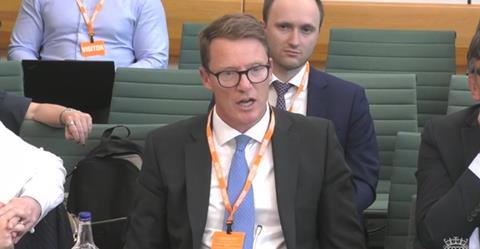Comments from NISTA’s Matthew Vickerstaff come as ministers weigh up benefits of relaunching initiative next month
The government’s new infrastructure advisory body has said ministers would need to “learn from the mistakes” of the past if a new generation of PFI contracts are launched as part of the upcoming infrastructure strategy.
Matthew Vickerstaff, deputy chief executive of the The National Infrastructure and Service Transformation Authority (NISTA), said there was still a “constant drumbeat” of construction issues on schools built through private finance initiatives (PFI).

Chancellor Rachel Reeves is understood to be considering reinstating a form of private financing to pay for public projects, including social infrastructure schemes such as schools, ahead of the launch of its 10-Year Infrastructure Strategy next month.
It would be the first major rollout of PFI in England since 2018, when then chancellor Philip Hammond declared the successor scheme to the original PFI programme as “inflexible and overly complex”.
>> See also: PFI: Do the numbers add up?
Speaking at a meeting of the Public Accounts Committee in Parliament yesterday, Vickerstaff highlighted issues that had blighted historic PFI schemes where construction risk had been transferred to the private sector.
“Just what we’re seeing on school projects, leaking roofs is a consistent, constant drum beat, fire door stopping, acoustics, lighting levels, the ability of classrooms to be operable in a white board environment, problems around leisure centres or sports facilities, contamination of land, latent defects of refurbishments on old buildings creating real problems,” he said.
“The dash to get the schools ready for September, I cannot tell you how many PFI schools have that problem, and we need to get the private sector to fix it.”
But while Vickerstaff said he was “ambivalent” about a new generation of PFI contracts, he argued contractual arrangements on new schemes could contain less risk for the public purse if the government did decide to opt for this route in its infrastructure strategy.
“I would say that compared with 25 years ago, the asset management, the building information systems and computer aided facilities management has vastly improved so we’re dealing with a generation of contracts that would certainly by improved whether it’s public sector or private sector,” he said.
“I’m ambivalent but what we need to make sure is that we learn from the mistakes and definitely get them to fix what we’re experiencing in some situations.”
Vickerstaff added: “In terms of lessons learned, making sure construction is monitored by a clerk of works and independently certified would be a really important factor moving forward, because construction defects have been a problem because the construction contracts whether it be public sector or private sector have not been well monitored or controlled.”
Meanwhile, a new report by PwC has called on the government to explore a new generation of public-private finance in order to address the deficit in infrastructure including schools and healthcare.
The research, published today, found “strong market appetite” for a new model of public-private partnerships which could be based on the Mutual Investment Model developed in Wales.
PwC corporate finance associate director Dan Whittle said: “There is a strong view that public-private finance has a valuable role to play as a strategic tool to close the UK’s infrastructure gap, particularly at a time when we are constrained by fiscal rules.
“There is no need to reinvent the fundamentals of the PPP model. What must continue to evolve is how we implement this model with refined risk allocation to reflect the current appetite of the market, smarter contract management, and a genuine partnership approach.”
���ܾ����徱�Բ�’s Funding the Future campaign is seeking to examine fresh ways of attracting and using finance to boost construction projects at a time of constrained public finances. It will examine options for public-private partnerships that can draw on private capital to pay for large infrastructure projects, schools, prisons, hospitals and housing.
The government is expected to unveil its infrastructure strategy alongside its spending review in June.
Funding the Future

���ܾ����徱�Բ�’s Funding the Future campaign seeks to examine fresh ways of attracting and using finance to boost construction projects at a time of constrained public finances.
It will examine options for public-private partnerships that can draw on private capital to pay for large infrastructure projects, schools, prisons, hospitals and housing.
It will also look at existing models for private and public funding and examine how these can be optimised to ensure funding is efficiently spent and leads to more shovels in the ground as Keir Starmer looks to construction to boost flagging economic growth.
Over the next few months we will share learning, consult with industry and collect ideas from readers. This will culminate in a special report to be published at our �ǿմ�ý the Future Live Conference in London on 2 October - click here to book your tickets now.
To share your ideas of new funding models, email carl.brown@assemblemediagroup.co.uk. To find the campaign on social media follow #�ǿմ�ýfundfuture.























No comments yet